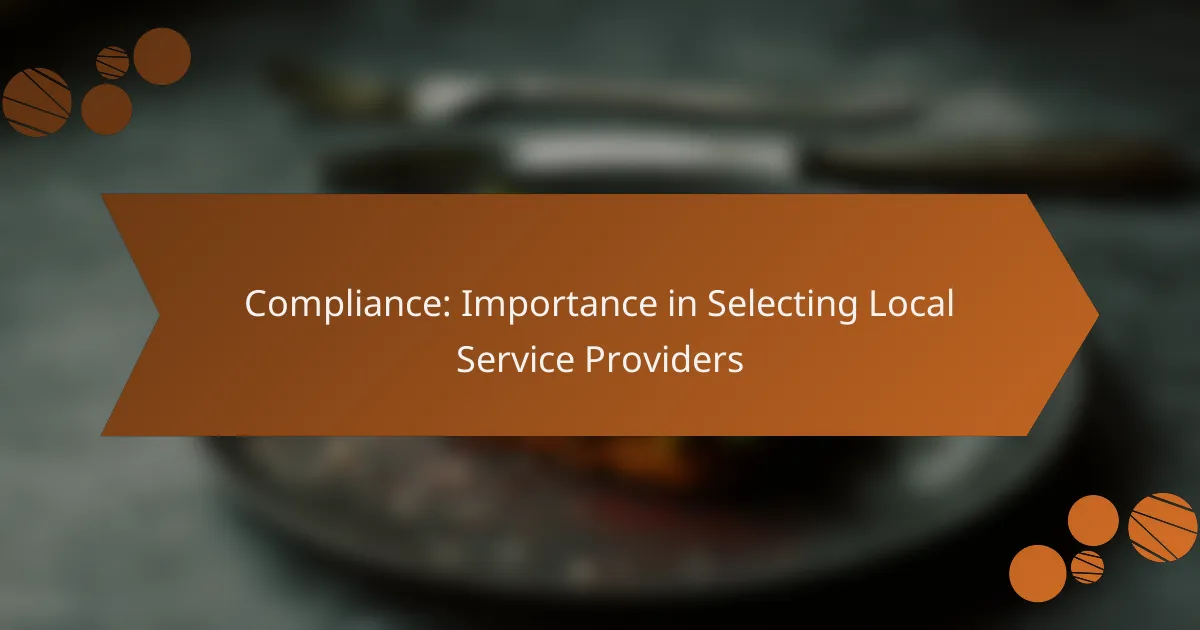Compliance plays a critical role in selecting local service providers, as it guarantees adherence to laws and regulations that safeguard both your business and customers. By prioritizing compliant providers, you reduce risks and build a foundation of trust with your clients, ensuring a reliable and legally sound partnership.

Why is compliance crucial for selecting local service providers?
Compliance is essential when choosing local service providers as it ensures they adhere to relevant laws and regulations, which protects your business and customers. Selecting compliant providers minimizes risks and fosters a trustworthy relationship with clients.
Ensures legal adherence
Choosing a compliant local service provider guarantees that they follow applicable laws and industry regulations. This includes labor laws, safety standards, and environmental regulations, which can vary significantly by region. For example, a construction company must comply with local building codes and safety regulations to avoid legal penalties.
Before engaging a service provider, verify their compliance certifications and licenses. This can often be done through local regulatory bodies or industry associations, ensuring that they meet the necessary legal requirements to operate in your area.
Builds customer trust
Compliance enhances customer trust, as clients feel more secure working with providers that follow legal and ethical standards. When a service provider demonstrates adherence to regulations, it signals reliability and accountability, which can lead to repeat business and positive referrals.
For instance, a local food service provider that complies with health regulations is more likely to attract customers who prioritize food safety. Displaying compliance certifications prominently can further reinforce this trust and encourage customer loyalty.
Reduces liability risks
Selecting compliant service providers helps mitigate liability risks associated with non-compliance. If a provider fails to meet legal standards, your business could face fines, lawsuits, or reputational damage. This is particularly relevant in sectors like construction, where accidents can lead to significant financial repercussions.
To minimize these risks, conduct thorough due diligence on potential providers. This includes reviewing their compliance history, checking for any past violations, and ensuring they carry adequate insurance coverage to protect against potential liabilities.

What are the key compliance requirements for local services?
Key compliance requirements for local services include obtaining necessary licenses and permits, ensuring adequate insurance coverage, and adhering to health and safety regulations. These elements are crucial for legal operation and protecting both the service provider and customers.
Licensing and permits
Licensing and permits are essential for local service providers to operate legally. Depending on the industry, businesses may need specific licenses issued by local or state authorities, which can vary widely. For instance, contractors may require a general contractor’s license, while food service providers need health permits.
To ensure compliance, verify the specific licensing requirements in your area. Check with local government websites or business associations for guidance. Failing to secure the proper licenses can lead to fines or business closure.
Insurance coverage
Insurance coverage protects both the service provider and clients from potential liabilities. Common types of insurance include general liability, professional liability, and workers’ compensation. Each type serves a different purpose, such as covering accidents on the job or errors in service delivery.
When selecting insurance, assess the risks associated with your specific services and choose coverage that adequately addresses those risks. It’s advisable to consult with an insurance agent familiar with local regulations to ensure you meet all necessary requirements.
Health and safety regulations
Health and safety regulations are designed to protect employees and customers from hazards. Local service providers must comply with these regulations, which may include workplace safety standards, sanitation practices, and employee training requirements. For example, construction companies must follow OSHA guidelines to ensure worker safety.
Regularly review and update your health and safety practices to align with local laws. Conducting safety audits and training sessions can help maintain compliance and reduce the risk of accidents. Non-compliance can result in severe penalties and damage to your business reputation.

How can you verify compliance of local service providers?
To verify the compliance of local service providers, you should assess their adherence to relevant regulations and standards. This involves requesting documentation, checking regulatory databases, and consulting customer reviews to ensure they meet necessary legal and operational requirements.
Request documentation
Start by asking local service providers for documentation that demonstrates their compliance with industry regulations. This may include licenses, certifications, insurance policies, and safety records. Ensure that the documents are current and relevant to the specific services they offer.
For example, if you’re hiring a construction contractor, request their building permits and proof of liability insurance. This helps verify that they are legally authorized to operate and have the necessary protections in place.
Check regulatory databases
Utilize online regulatory databases to confirm that the service provider is in good standing with local authorities. Many countries maintain public records of licensed professionals, which can include information about any violations or complaints. This step is crucial for ensuring that the provider adheres to local laws and regulations.
In the United States, for instance, you can check the licensing boards for various professions, while in Europe, similar databases exist for different sectors. Look for any red flags such as unresolved complaints or expired licenses.
Consult customer reviews
Customer reviews can provide valuable insights into a service provider’s reliability and compliance history. Look for feedback on platforms like Google Reviews, Yelp, or industry-specific sites. Pay attention to comments regarding the provider’s adherence to regulations and quality of service.
Be cautious of overly positive or negative reviews, as they may not reflect the true nature of the service. Aim to find a balanced view, and consider reaching out to previous clients for direct feedback on their experiences with compliance and service quality.

What are the risks of non-compliance for local service providers?
Non-compliance for local service providers can lead to serious repercussions, including legal penalties, damage to reputation, and significant financial losses. Understanding these risks is crucial for maintaining operational integrity and ensuring long-term success.
Legal penalties
Local service providers face various legal penalties if they fail to comply with regulations. These penalties can range from fines to suspension of business licenses, depending on the severity of the violation. For instance, a service provider in the EU might incur fines reaching up to 4% of annual revenue for data protection breaches under GDPR.
To mitigate legal risks, service providers should stay informed about relevant laws and regulations in their jurisdiction. Regular compliance audits and training for staff can help ensure adherence to legal standards.
Reputation damage
Non-compliance can severely damage a service provider’s reputation, leading to loss of customer trust and potential business opportunities. A single incident of non-compliance can result in negative publicity, which may take years to recover from. For example, a local contractor who fails to meet safety standards may find it difficult to secure future contracts.
To protect their reputation, service providers should prioritize transparency and communication with clients. Actively promoting compliance efforts can help build trust and demonstrate commitment to quality and safety.
Financial losses
Financial losses due to non-compliance can be substantial, impacting both immediate cash flow and long-term profitability. Costs may arise from fines, legal fees, and lost business opportunities. Additionally, companies may need to invest in corrective measures, which can strain resources.
Service providers can minimize financial risks by implementing robust compliance management systems. Regularly reviewing financial practices and ensuring alignment with regulatory requirements can help avoid costly pitfalls.

How does compliance impact pricing for local services?
Compliance significantly affects pricing for local services by adding costs associated with meeting regulatory standards. Providers that adhere to these regulations may charge higher fees to cover their compliance expenses, which can include training, certifications, and audits.
Higher costs for compliant providers
Compliant service providers often incur additional expenses that can lead to higher pricing. These costs may stem from maintaining licenses, conducting regular training for staff, and implementing necessary safety measures. For example, a local construction firm that follows safety regulations may charge 10-20% more than a non-compliant competitor.
When selecting a provider, consider the long-term benefits of compliance, such as reliability and quality assurance. While upfront costs may be higher, compliant providers often deliver better service, reducing the risk of costly mistakes or legal issues.
Potential savings from reduced risks
Choosing compliant providers can lead to significant savings by minimizing risks associated with non-compliance, such as fines or legal fees. For instance, a business that hires a compliant contractor may avoid penalties that could range from hundreds to thousands of dollars, depending on the severity of the violation.
Additionally, compliant services often result in fewer disruptions and higher customer satisfaction, which can translate into cost savings over time. By investing in compliant providers, businesses can enhance their reputation and reduce the likelihood of costly incidents, making it a financially sound choice in the long run.

What frameworks can help assess compliance in local services?
To assess compliance in local services, frameworks such as compliance checklists and third-party audits are essential tools. These frameworks help ensure that service providers meet legal, regulatory, and industry standards, thereby reducing risks associated with non-compliance.
Compliance checklists
Compliance checklists are practical tools that outline the specific requirements a local service provider must meet. These lists typically cover areas such as licensing, safety regulations, and environmental standards, allowing businesses to systematically verify compliance.
When creating a checklist, consider including items relevant to your industry and locale. For example, a checklist for a construction service in the EU might include compliance with the Construction Products Regulation and local building codes. Regularly updating the checklist ensures it remains relevant to current regulations.
Third-party audits
Third-party audits involve hiring an external organization to evaluate a service provider’s compliance with applicable standards. These audits provide an unbiased assessment and can identify gaps in compliance that internal reviews might overlook.
Engaging a reputable auditing firm can enhance credibility and trust with clients. It’s advisable to choose auditors familiar with local regulations and industry practices. Regular audits, perhaps annually or biannually, help maintain ongoing compliance and can be a valuable part of risk management strategies.
